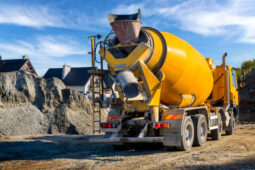Go offline with the Player FM app!
Decarbonizing Cement Production
Manage episode 464985701 series 3561

Tackling Cement’s Huge Carbon Footprint (start time: 0:58) It’s hard to imagine modern society without a key material that so many structures depend on–cement. Think of our houses, apartment and office buildings, hospitals, parking lots, bridges, and, increasingly, massive data centers of big-tech companies. But that societal glue of sorts comes with a big climate price tag. Cement production accounts for more than 7 percent of global greenhouse gas emissions. That’s way less than the amount from coal and oil & gas production, but roughly double the emissions from aviation. So, finding ways to reduce the carbon footprint of cement could go a long way toward curbing the momentum of climate change and its impacts. But some players in the industry, as well as in state and federal governments, are making strides to clean up the cement industry’s act. In this week’s How On Earth, host Susan Moran interviews Anish Tilak, a civil and environmental engineer who is a a manager of the Carbon-Free Buildings program at RMI (founded as Rocky Mountain Institute); and Cory Waltrip, a senior manager at the startup Sublime Systems, in Somerville, Mass.
Host / Show Producer: Susan Moran
Engineer: Jackie Sedley
Executive Producer: Beth Bennett
Listen to the show here:
716 episodes
Manage episode 464985701 series 3561

Tackling Cement’s Huge Carbon Footprint (start time: 0:58) It’s hard to imagine modern society without a key material that so many structures depend on–cement. Think of our houses, apartment and office buildings, hospitals, parking lots, bridges, and, increasingly, massive data centers of big-tech companies. But that societal glue of sorts comes with a big climate price tag. Cement production accounts for more than 7 percent of global greenhouse gas emissions. That’s way less than the amount from coal and oil & gas production, but roughly double the emissions from aviation. So, finding ways to reduce the carbon footprint of cement could go a long way toward curbing the momentum of climate change and its impacts. But some players in the industry, as well as in state and federal governments, are making strides to clean up the cement industry’s act. In this week’s How On Earth, host Susan Moran interviews Anish Tilak, a civil and environmental engineer who is a a manager of the Carbon-Free Buildings program at RMI (founded as Rocky Mountain Institute); and Cory Waltrip, a senior manager at the startup Sublime Systems, in Somerville, Mass.
Host / Show Producer: Susan Moran
Engineer: Jackie Sedley
Executive Producer: Beth Bennett
Listen to the show here:
716 episodes
All episodes
×Welcome to Player FM!
Player FM is scanning the web for high-quality podcasts for you to enjoy right now. It's the best podcast app and works on Android, iPhone, and the web. Signup to sync subscriptions across devices.




